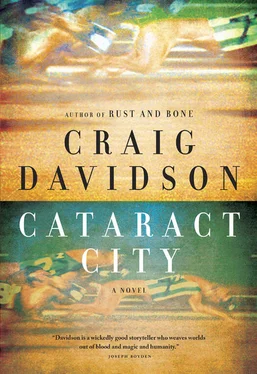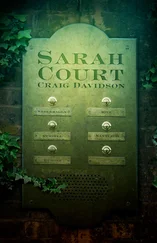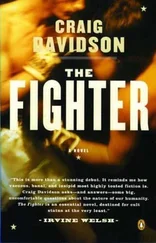“They’re practically building cities,” she’d say disgustedly.
Bovine enjoyed the attention but his folks were mortified. They bought special shampoo from the veterinarian that made his scalp smell like a freshly tarred road.
While no paragon of personal hygiene, Bovine was miles ahead of us in his knowledge of forbidden lore. He knew that if you spat on a hot light bulb it would explode in a shower of white glass and sparkling powder — which, Bovine claimed, would kill you if you inhaled it. He also knew that feeding a frog an Alka-Seltzer tablet would, in his words, “Make it blow up like a gooey green grenade.” Most carnal was his knowledge of women, their anatomies, and how to satisfy them.
“Did you see last week’s movie?” he’d ask Dunk and me at recess. “That girl who came out of the pond with her top off? Whoa! Some real humungoes.”
Neither of us knew what to make of Bovine. Being around him gave you that feeling you got after eating too much candy on Halloween: hyper and a little sick.
“You know what women with big bazooms like? If you squeeze them like kneading pizza dough. It drives them wild. They’ll rip all their clothes off if you squeeze their big knockers long enough.”
Our neighbourhood was small, but like most neighbourhoods possessed its fair share of mystery. One night we were watching the Baby Blue Movie when it started to snow. Dunk and I crammed onto a chair, balanced on our tiptoes, and peered out the basement window that overlooked my front yard. Big fat flakes fell through the street lights, eddying in the updrafts skating down our narrow street.
“Holy lick,” Dunk said. “ Look .”
A woman was walking down the street. Slowly, with her arms upraised the way Pentecostals do in church. Not a stitch of clothing on her body. The naked woman walked upright as if the howling wind had no effect on her. For an instant I thought she was a ghost. She was as pale as chalk. She wasn’t shivering, either. My skin froze just looking at her.
Pressed together tightly on the same chair, I could see Dunk’s heartbeat through his wrist, hooked over the window ledge.
“That’s Mrs. Lovegrove,” he said. “She lives across the road, two down from me.”
Elsa Lovegrove’s body was similar to the bodies of other Cataract City women I’d unclothe years later. Her chest bones stood out like fingers under small breasts tipped with the dark rosettes of her nipples. She looked nothing like the women in the Baby Blue Movie — those women’s lush bodies were built for cavorting. Mrs. Lovegrove’s body appeared to be composed of pure bone.
The wind whipped her long hair up to frame her face: it looked as if she’d lain down in a still pool of water. She may have been laughing or crying, I couldn’t tell. Her husband rushed down the road and draped a blanket over Elsa’s shoulders. Later we’d find out that her son had been killed that night in a late-season funny-car accident at the Merrittville Speedway.
On the weekends we would stay up to watch the WWF Saturday Night’s Main Event , with “Mean Gene” Okerlund and Gorilla Monsoon broadcasting the action from exotic ports of call like the Pontiac Silverdome or the pearl of the Pacific, Honolulu’s Aloha Stadium.
Dunk liked the high-fliers: Jimmy “Superfly” Snuka and Ricky “the Dragon” Steamboat. I liked the guys with a flexible moral code like Jake “the Snake” Roberts. He was flat-footed, wore a greasy T-shirt and carried a seven-foot python in a sack. He wasn’t friends with anybody, but he wasn’t a backstabber either. And when he cinched up his DDT move, your ass was grass and he, as Bovine would say, was the lawn mower.
Saturday afternoon wrestling was different. On those shows, you’d see marquee wrestlers matched up against jobbers — ham ’n’ eggers, as Bobby “the Brain” Heenan called them. Poor saps like “Leaping” Lanny Poffo, “Iron” Mike Sharpe and the Brooklyn Brawler would get squashed by main eventers. But Saturday nights , the Main Event? No jobbers allowed.
On Saturday nights we’d get Randy “Macho Man” Savage and Miss Elizabeth. André the Giant squaring off against King Kong Bundy — the irresistible force meeting the immovable object. Meddling managers like Jimmy “the Mouth of the South” Hart. Scheming villains like “Rowdy” Roddy Piper. Otherworldly creatures like George “the Animal” Steele. Gorilla Monsoon saying: “This place has gone bananas!” or “Ladies and gentlemen, Madison Square Garden just literally exploded!”
The only wrestler we hated was Hulk Hogan. Mister “Train, say your prayers, eat your vitamins, be true to yourself and your country — be a real American! ” How cheeseball could you get?
To Dunk and me, wrestling made sense in an elemental way. Everything was defined and sensible within that squared circle. There were your heels and your babyfaces. Cheaters would cheat, schemers would scheme, but ultimately you paid what you owed. We understood the crest and ebb of a match, its rising and falling action. Even at ten years old we could appreciate the perfect finality to it all. When the Macho Man launched his flying elbow off the top rope, it was over. When Hulk Hogan dropped the big leg. When the Brain Busters hit their spike piledriver.
One Saturday night my dad came downstairs in his housecoat. It was around the time he’d been promoted to supervisor. Our house had been egged the week before; there was a suspicion that some guys at work had done it, though I found it impossible to believe forty-year-olds would do such a thing. Dad sat with a sigh that seemed to come less from his lungs than his bones.
“Wrestling, huh?” he said. “Those fellas can sure fill out a pair of tights.”
Hulk Hogan was fighting “Mr. Wonderful” Paul Orndorff in a steel cage match. Hulk Hogan bodyslammed Mr. Wonderful, then cupped his ear to drink in the roar of the crowd. We cheered our guts out for Mr. Wonderful, even though he was the heel.
“The Hulkster looks unstoppable,” Dad said with a sly smile. “Something tells me he’s going to win.”
“Bruiser Mahoney would beat the crud out of Hulk Hogan,” Dunk said. “Bruiser would eliminate him.”
“This Bruiser Mahoney sure sounds like something,” Dad said.
“Mr. Stuckey, Bruiser Mahoney is the greatest wrestler who has ever lived,” Dunk said with a bone-deep earnestness that my father surely found funny. “He’s fighting in two weeks at the arena.”
“Can we go?” I asked Dad.
“Is your father taking you, Duncan?”
“Yes, sir. We’ll be sitting in the front row.”
Dad nodded. “Let’s go watch some wrasslin’.”
And so the first Saturday of every month became father-son wrestling night. When the lights dimmed and Bruiser Mahoney’s voice boomed over the loudspeakers—“You’re cruisin’ for a bruuuuuisin’! ”—the place went electric.
Bruiser would storm down the Zamboni chute, sprinting to the ring so fast that his robe unfurled behind him like crimson wings. Vaulting over the ropes, he’d start to swing pure dynamite. He was untamed and breathtaking. His opponent didn’t know what the hell hit him. Neither did I.
“That Bruiser Mahoney really is something,” my father said that first night.
After that, Dunk’s father began to drop by on Fridays for a beer with my dad. Mr. Diggs would bring Dunk with him, or Dunk would already be over. One beer turned into five, plus a shot or two of Famous Grouse, which ran seven-fifty a bottle over the river. Our fathers would talk while we horsed around in the backyard with Sam Bovine, who had a tendency to latch onto us like a burr for days at a time. The boom of the Falls carried over the treetops to merge with the hiss of beer can pull-tabs and our fathers’ heavy, smoke-roughened laughter.
Читать дальше












